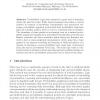Free Online Productivity Tools
i2Speak
i2Symbol
i2OCR
iTex2Img
iWeb2Print
iWeb2Shot
i2Type
iPdf2Split
iPdf2Merge
i2Bopomofo
i2Arabic
i2Style
i2Image
i2PDF
iLatex2Rtf
Sci2ools
110
click to vote
PKDD
2009
Springer
2009
Springer
Integrating Logical Reasoning and Probabilistic Chain Graphs
Probabilistic logics have attracted a great deal of attention during the past few years. While logical languages have taken a central position in research on knowledge representation and automated reasoning, probabilistic graphical models with their probabilistic basis have taken up a similar position when it comes to reasoning with uncertainty. The formalism of chain graphs is increasingly seen as a natural probabilistic graphical formalism as it generalises both Bayesian networks and Markov networks, and has a semantics which allows any Bayesian network to have a unique graphical representation. At the same time, chain graphs do not support modelling and learning of relational aspects of a domain. In this paper, a new probabilistic logic, chain logic, is developed along the lines of probabilistic Horn logic. The chain logic leads to relational models of domains in which associational and causal knowledge are relevant and where probabilistic parameters can be learned from data.
Related Content
| Added | 27 May 2010 |
| Updated | 27 May 2010 |
| Type | Conference |
| Year | 2009 |
| Where | PKDD |
| Authors | Arjen Hommersom, Nivea de Carvalho Ferreira, Peter J. F. Lucas |
Comments (0)

